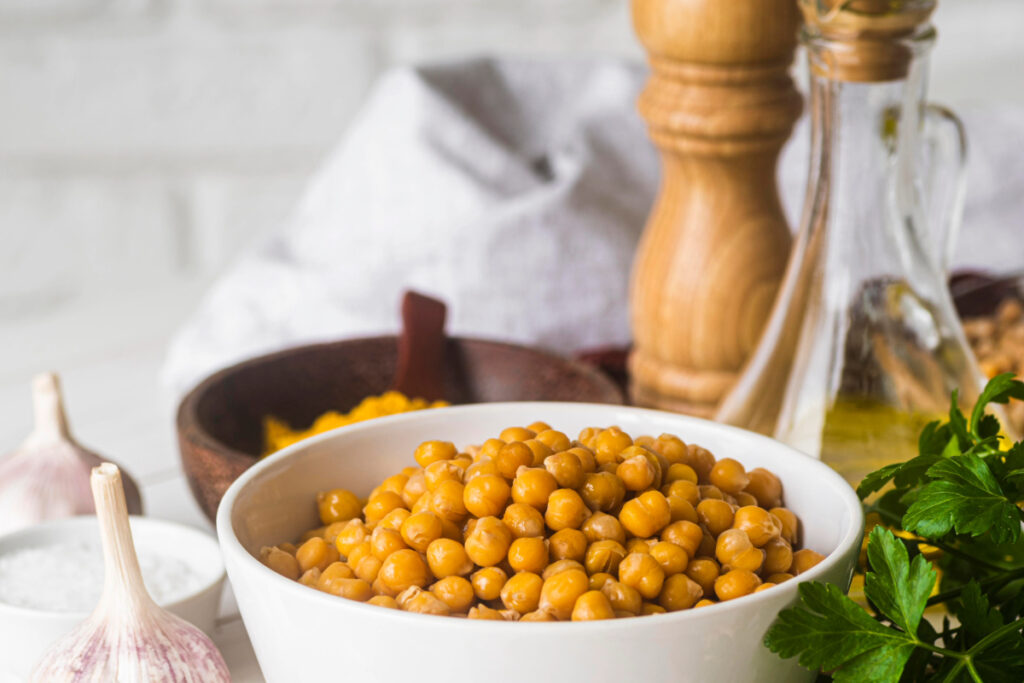Chickpeas, also known as garbanzo beans, are beloved for their versatility, affordability, and nutritional benefits. They’re a staple in vegan and vegetarian diets, frequently found in recipes like hummus, salads, stews, and snacks. But are chickpeas ever unhealthy? While generally celebrated as a health food, chickpeas do have potential drawbacks worth understanding. This article explores the nutritional profile of chickpeas, potential health risks, and tips to maximize their benefits.

What Makes Chickpeas a Healthy Choice?
Chickpeas are packed with nutrients that contribute to overall health. Here’s a closer look at what they offer:
Nutritional Profile
- Protein: A rich source of plant-based protein, making them a great alternative to meat.
- Fiber: Promotes digestion and helps regulate cholesterol levels.
- Vitamins and minerals: Chickpeas are rich in iron, magnesium, folate, and zinc, essential for immune support, bone health, and red blood cell production.
Additionally, chickpeas have a low glycemic index (GI), meaning they release sugar into the bloodstream slowly, helping to maintain steady energy levels. If you’re curious about other plant-based swaps, check out this guide to replacing butter with bananas in baking for healthier alternatives in the kitchen.
Are Chickpeas Ever Unhealthy?
Though chickpeas are highly nutritious, they may not be suitable for everyone. Here are some reasons why chickpeas could be considered “unhealthy” in certain situations:
1. Digestive Issues
Chickpeas are high in fiber, which is beneficial for most people. However, excessive fiber intake can cause:
- Bloating and gas: As fiber ferments in the gut, it can produce gas, leading to discomfort.
- Stomach cramps: Particularly in individuals unaccustomed to high-fiber diets.
To minimize these effects, it’s crucial to introduce chickpeas gradually into your diet. Soaking and cooking them thoroughly can also ease digestion. For more on high-fiber foods, check out this overview of fiber’s impact on digestion.
2. Antinutrients in Chickpeas
Chickpeas contain natural compounds known as antinutrients, which can hinder the absorption of certain minerals:
- Phytic Acid: Binds to minerals like iron and zinc, reducing their bioavailability.
- Lectins: May cause gastrointestinal distress if consumed in large quantities or if chickpeas are undercooked.
The good news? Proper preparation techniques, such as soaking, sprouting, and cooking chickpeas, can significantly reduce these antinutrients. These methods also improve the digestibility and nutrient absorption of legumes.
3. Allergies and Intolerances
Although rare, some people are allergic to chickpeas. Symptoms may include:
- Skin rashes or hives.
- Digestive upset, such as nausea or stomach pain.
- In severe cases, anaphylaxis, which requires immediate medical attention.
If you suspect a chickpea allergy, consult with a healthcare provider for proper testing and dietary advice.
4. Calorie Density in Processed Chickpea Products
While whole chickpeas are low in calories, processed versions like roasted chickpeas or hummus can be calorie-dense due to added oils and seasonings. Overeating these snacks can lead to unintended weight gain. For example, many people are unaware of how extra ingredients affect calorie counts in plant-based dishes. Explore this banana bread recipe with reduced butter for insights into how ingredient swaps can reduce calorie intake.
The Benefits of Eating Chickpeas
Despite these potential concerns, the benefits of chickpeas far outweigh their downsides. Here’s why they deserve a place in your diet:
1. Heart Health
Chickpeas are high in soluble fiber, which can help lower LDL (bad) cholesterol. This reduces the risk of heart disease and supports overall cardiovascular health.
2. Blood Sugar Regulation
The low glycemic index of chickpeas helps prevent blood sugar spikes, making them an excellent food choice for individuals with diabetes or those monitoring their blood sugar levels.
3. Weight Management
Thanks to their combination of protein and fiber, chickpeas promote satiety, helping you feel full longer. This can reduce overeating and support weight management goals.
For sustainable eating ideas, explore the ultimate guide to seasoning avocado toast to pair chickpeas with other healthy plant-based options.
FAQs About Chickpeas
Can chickpeas cause digestive issues?
Yes, for some people, the fiber in chickpeas can lead to bloating or gas. Soaking and cooking them thoroughly can help minimize this.
Are chickpeas safe to eat every day?
Absolutely! However, stick to recommended portion sizes (½ to 1 cup per day) to avoid potential digestive discomfort or overloading on calories.
Do chickpeas impact nutrient absorption?
Their phytic acid content can reduce the absorption of minerals like iron and zinc, but soaking and cooking them mitigates this effect.
Are chickpeas bad for weight loss?
No, but calorie-dense processed chickpea products like hummus should be eaten in moderation to avoid exceeding daily caloric needs.
Tips for Including Chickpeas in Your Diet
To maximize the benefits of chickpeas while minimizing potential drawbacks, follow these tips:
- Prepare Chickpeas Properly:
- Soak: Soak dried chickpeas for 8–12 hours to reduce antinutrients.
- Cook: Cooking eliminates lectins, making chickpeas safe to eat.
- Sprout: Sprouting increases nutrient availability.
- Practice Portion Control:
- Stick to a serving size of ½ to 1 cup of cooked chickpeas per day.
- Limit consumption of calorie-dense snacks like roasted chickpeas or chickpea chips.
- Pair with Nutrient-Boosting Foods:
- Combine chickpeas with vitamin C-rich foods, like tomatoes or bell peppers, to enhance iron absorption.
- Add them to salads, soups, and grain bowls for a balanced, nutritious meal.
Sustainable Benefits of Chickpeas
Chickpeas are not only good for your health but also for the planet. As a low-impact crop, they require less water and energy compared to animal-based proteins. Including chickpeas in your diet contributes to a more sustainable food system. Discover how simple swaps, like using plant-based proteins, can make a difference in this overview of sustainable eating.
Final Thoughts
Chickpeas are a powerhouse of nutrition and a versatile addition to any diet. While they may cause minor issues for some—like bloating or reduced mineral absorption—these concerns can be mitigated with proper preparation and mindful portion control. Their benefits, including heart health, blood sugar regulation, and sustainable eating, make them a valuable ingredient in a balanced diet.
To explore more creative ways to include chickpeas in your meals, check out the Marry Me Chickpeas recipe for a flavorful twist. Incorporating chickpeas into your diet mindfully can help you reap their numerous health benefits without worry.
Enjoy chickpeas as part of your journey toward healthier, more sustainable eating!
